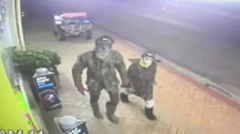Renewed demands arise for an official investigation following allegations of brutality against protesters during recent tax protests in Nairobi.
Calls for Accountability Amidst Outcry Over Kenya's Protest Violence

Calls for Accountability Amidst Outcry Over Kenya's Protest Violence
Investigative report sheds light on deadly clashes between security forces and protesters in Kenya.
In the wake of a BBC Africa Eye investigation revealing that Kenyan security forces were involved in the deaths of three unarmed protesters during anti-tax demonstrations, calls for accountability are intensifying. Human rights groups like Amnesty International and the Kenya Human Rights Commission (KHRC) are urging that the identified officers be prosecuted for their actions.
The protests erupted on June 25, 2024, during a parliament vote on a controversial finance bill that aimed to raise $2.7 billion to reduce reliance on external borrowing. Over 100,000 individuals took to the streets in Nairobi, objecting to the tax proposals. The documentary exposed how police and military personnel employed excessive force against peaceful demonstrators, leading to a reported death toll of at least 65 according to Amnesty International, with the Kenyan government reporting 42 deaths.
In response to the uproar, government spokesperson Isaac Mwaura defended the security forces' actions, emphasizing the importance of maintaining order and dismissed the documentary's portrayal as biased. The Independent Policing Oversight Authority (IPOA), tasked with investigating allegations against police, has seen little collaboration from the Kenyan Defence Forces (KDF), which claims it has not received requests for investigation into its personnel regarding these events.
The BBC's documentary, titled "Blood Parliament," was set to screen in Nairobi but was canceled under pressure from authorities. It included footage revealing a policeman and a soldier identified as having shot and killed protesters. The IPOA has indicated that investigations into the deaths are ongoing, with findings from 60 reported deaths, and 41 involving gunshot wounds.
Amnesty International has called for a public inquiry, asserting that the government must take responsibility for the "unnecessary and excessive lethal force" used against demonstrators. Social media platforms have seen Kenyans rallying for accountability, criticizing the government’s inadequate response to the violence and demanding justice for the deceased.
Despite the government's opposition to the documentary, some politicians have defended its right to exist, stressing the importance of accountability and truthful representation of the events. As tensions simmer, the future of Kenya's accountability for these violent protests hangs in the balance, with many demanding that those in power be held responsible for the violence witnessed on the streets.
The protests erupted on June 25, 2024, during a parliament vote on a controversial finance bill that aimed to raise $2.7 billion to reduce reliance on external borrowing. Over 100,000 individuals took to the streets in Nairobi, objecting to the tax proposals. The documentary exposed how police and military personnel employed excessive force against peaceful demonstrators, leading to a reported death toll of at least 65 according to Amnesty International, with the Kenyan government reporting 42 deaths.
In response to the uproar, government spokesperson Isaac Mwaura defended the security forces' actions, emphasizing the importance of maintaining order and dismissed the documentary's portrayal as biased. The Independent Policing Oversight Authority (IPOA), tasked with investigating allegations against police, has seen little collaboration from the Kenyan Defence Forces (KDF), which claims it has not received requests for investigation into its personnel regarding these events.
The BBC's documentary, titled "Blood Parliament," was set to screen in Nairobi but was canceled under pressure from authorities. It included footage revealing a policeman and a soldier identified as having shot and killed protesters. The IPOA has indicated that investigations into the deaths are ongoing, with findings from 60 reported deaths, and 41 involving gunshot wounds.
Amnesty International has called for a public inquiry, asserting that the government must take responsibility for the "unnecessary and excessive lethal force" used against demonstrators. Social media platforms have seen Kenyans rallying for accountability, criticizing the government’s inadequate response to the violence and demanding justice for the deceased.
Despite the government's opposition to the documentary, some politicians have defended its right to exist, stressing the importance of accountability and truthful representation of the events. As tensions simmer, the future of Kenya's accountability for these violent protests hangs in the balance, with many demanding that those in power be held responsible for the violence witnessed on the streets.



















